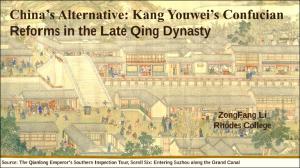Please use this identifier to cite or link to this item:
http://hdl.handle.net/10267/33447Full metadata record
| DC Field | Value | Language |
|---|---|---|
| dc.contributor.advisor | Lee, Seok-Won | - |
| dc.contributor.author | Li, Zong Fang (Neil) | - |
| dc.date.accessioned | 2018-05-09T15:13:18Z | - |
| dc.date.available | 2018-05-09T15:13:18Z | - |
| dc.date.issued | 2018-04-27 | - |
| dc.identifier.uri | http://hdl.handle.net/10267/33447 | - |
| dc.description | Presentation by ZongFang Li ('18) delivered at the Rhodes College Undergraduate Research and Creative Activity Symposium (URCAS). | - |
| dc.description.abstract | Nineteenth century China was a time of turmoil. Facing both internal and external threats, Intellectuals in late nineteenth century China had their own interpretation toward the fate of China. Intellectuals were debating the most fundamental questions: what is the role of Confucianism in China' future. Western audiences in 1960s and 1970s commonly believed that Confucianism itself is an obstacle for China to modernize, since modern China eventually did not put emphasis on Confucianism and its social structures. However, Kang You wei was one of intellectuals in nineteenth century China who tried to change Qing China into a constitutional monarchy that put emphasis on Confucianism institution. This URCAS presentation tries to show Kang You wei' effort of preserving Chinese tradition and maintaining Confucian institution, by analyzing Kang's primary sources. Therefore, this president hopes to give a clearer picture to the audiences about China's struggle in modernization and major factors in its failures of preserving Confucian institutions. | - |
| dc.subject | URCAS | - |
| dc.subject | Student research | - |
| dc.subject | 2018 Spring | - |
| dc.subject | Class of 2018 | - |
| dc.subject | Asian Historical Studies | - |
| dc.subject | History, Department of | - |
| dc.title | Kang Youwei and the Modernization of China | - |
| dc.date.graduation | 2018 | - |
| Appears in Collections: | Undergraduate Research and Creative Activity Symposium | |
Files in This Item:
| File | Description | Size | Format | |
|---|---|---|---|---|
| 201804_li_fanglong_chinamodernization_slidedeck.pdf | 2.53 MB | Adobe PDF |  View/Open |
Items in DSpace are protected by copyright, with all rights reserved, unless otherwise indicated.